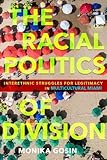The Racial Politics of Division : Interethnic Struggles for Legitimacy in Multicultural Miami / Monika Gosin.
Material type: TextPublisher: Ithaca, NY : Cornell University Press, [2019]Copyright date: ©2019Description: 1 online resource (276 p.) : 2 chartsContent type:
TextPublisher: Ithaca, NY : Cornell University Press, [2019]Copyright date: ©2019Description: 1 online resource (276 p.) : 2 chartsContent type: - 9781501738258
- 305.8009759381 23
- F319.M6 G67 2020
- online - DeGruyter
| Item type | Current library | Call number | URL | Status | Notes | Barcode | |
|---|---|---|---|---|---|---|---|
 eBook
eBook
|
Biblioteca "Angelicum" Pont. Univ. S.Tommaso d'Aquino Nuvola online | online - DeGruyter (Browse shelf(Opens below)) | Online access | Not for loan (Accesso limitato) | Accesso per gli utenti autorizzati / Access for authorized users | (dgr)9781501738258 |
Frontmatter -- Contents -- Acknowledgments -- Introduction -- 1. Race Making: Miami and the Nation -- 2. Marielitos, the Criminalization of Blackness, and Constructions of Worthy Citizenship -- 3. And Justice for All?: Immigration and African American Solidarity -- 4. Framing the Balsero Crisis: The Racial and Moral Politics of Suffering -- 5. Afro-Cuban Encounters at the Intersections of Blackness and Latinidad -- Conclusion -- Notes -- References -- Index
restricted access online access with authorization star
http://purl.org/coar/access_right/c_16ec
The Racial Politics of Division deconstructs antagonistic discourses that circulated in local Miami media between African Americans, "white" Cubans, and "black" Cubans during the 1980 Mariel Boatlift and the 1994 Balsero Crisis. Monika Gosin challenges exclusionary arguments pitting these groups against one another and depicts instead the nuanced ways in which identities have been constructed, negotiated, rejected, and reclaimed in the context of Miami's historical multiethnic tensions. Focusing on ideas of "legitimacy," Gosin argues that dominant race-making ideologies of the white establishment regarding "worthy citizenship" and national belonging shape inter-minority conflict as groups negotiate their precarious positioning within the nation. Rejecting oversimplified and divisive racial politics, The Racial Politics of Division portrays the lived experiences of African Americans, white Cubans, and Afro-Cubans as disrupters in the binary frames of worth-citizenship narratives. Foregrounding the oft-neglected voices of Afro-Cubans, Gosin posits new narratives regarding racial positioning and notions of solidarity in Miami. By looking back to interethnic conflict that foreshadowed current demographic and social trends, she provides us with lessons for current debates surrounding immigration, interethnic relations, and national belonging. Gosin also shows us that despite these new demographic realities, white racial power continues to reproduce itself by requiring complicity of racialized groups in exchange for a tenuous claim on US citizenship.
Mode of access: Internet via World Wide Web.
In English.
Description based on online resource; title from PDF title page (publisher's Web site, viewed 26. Apr 2024)


